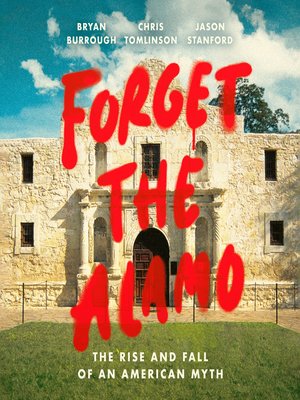
Sign up to save your library
With an OverDrive account, you can save your favorite libraries for at-a-glance information about availability. Find out more about OverDrive accounts.
Find this title in Libby, the library reading app by OverDrive.



Search for a digital library with this title
Title found at these libraries:
| Loading... |
A New York Times bestseller!
“Lively and absorbing. . ." — The New York Times Book Review
"Engrossing." —Wall Street Journal
“Entertaining and well-researched . . . ” —Houston Chronicle
Three noted Texan writers combine forces to tell the real story of the Alamo, dispelling the myths, exploring why they had their day for so long, and explaining why the ugly fight about its meaning is now coming to a head.
Every nation needs its creation myth, and since Texas was a nation before it was a state, it's no surprise that its myths bite deep. There's no piece of history more important to Texans than the Battle of the Alamo, when Davy Crockett and a band of rebels went down in a blaze of glory fighting for independence from Mexico, losing the battle but setting Texas up to win the war. However, that version of events, as Forget the Alamo definitively shows, owes more to fantasy than reality. Just as the site of the Alamo was left in ruins for decades, its story was forgotten and twisted over time, with the contributions of Tejanos—Texans of Mexican origin, who fought alongside the Anglo rebels—scrubbed from the record, and the origin of the conflict over Mexico's push to abolish slavery papered over. Forget the Alamo provocatively explains the true story of the battle against the backdrop of Texas's struggle for independence, then shows how the sausage of myth got made in the Jim Crow South of the late nineteenth and early twentieth century. As uncomfortable as it may be to hear for some, celebrating the Alamo has long had an echo of celebrating whiteness.
In the past forty-some years, waves of revisionists have come at this topic, and at times have made real progress toward a more nuanced and inclusive story that doesn't alienate anyone. But we are not living in one of those times; the fight over the Alamo's meaning has become more pitched than ever in the past few years, even violent, as Texas's future begins to look more and more different from its past. It's the perfect time for a wise and generous-spirited book that shines the bright light of the truth into a place that's gotten awfully dark.
“Lively and absorbing. . ." — The New York Times Book Review
"Engrossing." —Wall Street Journal
“Entertaining and well-researched . . . ” —Houston Chronicle
Three noted Texan writers combine forces to tell the real story of the Alamo, dispelling the myths, exploring why they had their day for so long, and explaining why the ugly fight about its meaning is now coming to a head.
Every nation needs its creation myth, and since Texas was a nation before it was a state, it's no surprise that its myths bite deep. There's no piece of history more important to Texans than the Battle of the Alamo, when Davy Crockett and a band of rebels went down in a blaze of glory fighting for independence from Mexico, losing the battle but setting Texas up to win the war. However, that version of events, as Forget the Alamo definitively shows, owes more to fantasy than reality. Just as the site of the Alamo was left in ruins for decades, its story was forgotten and twisted over time, with the contributions of Tejanos—Texans of Mexican origin, who fought alongside the Anglo rebels—scrubbed from the record, and the origin of the conflict over Mexico's push to abolish slavery papered over. Forget the Alamo provocatively explains the true story of the battle against the backdrop of Texas's struggle for independence, then shows how the sausage of myth got made in the Jim Crow South of the late nineteenth and early twentieth century. As uncomfortable as it may be to hear for some, celebrating the Alamo has long had an echo of celebrating whiteness.
In the past forty-some years, waves of revisionists have come at this topic, and at times have made real progress toward a more nuanced and inclusive story that doesn't alienate anyone. But we are not living in one of those times; the fight over the Alamo's meaning has become more pitched than ever in the past few years, even violent, as Texas's future begins to look more and more different from its past. It's the perfect time for a wise and generous-spirited book that shines the bright light of the truth into a place that's gotten awfully dark.






